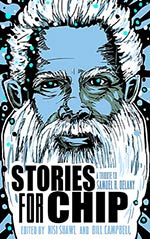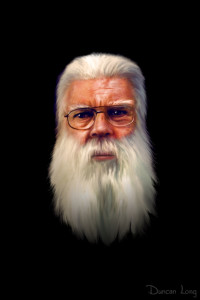
![]() charlesdee
charlesdee
12/13/2015
![]()
Stories for Chip is a collection of fiction and essays in honor of Samuel R. Delany. Two ways of approaching this review suggest themselves.
1. Since I have read only two Delany novels and would place neither on my favorite list, I could humbly remove myself from making further comment.
2. I could consider my relative lack of first hand experience of Delany's work as a plus when it comes to considering the stories anthologized here strictly on their own merits.
Obviously I am going to go with the second option, but I need to say something more about the first.
I read Nova and The Einstein Intersection about four years ago. Nova I didn't particularly like for reasons I no longer clearly remember. Einstein entertained and intrigued me, although I remember not quite "getting" the end. Looking at other reader reviews, I saw that I was not alone in that response. Looking recently at a range of reader reviews I see that Delany can be a polarizing author. Encomia are balanced out by disparaging comments from those who find the work opaque or over-written. This is especially true when it comes to Delany's big books, Dahlgren and Stars in My Pocket Like Grains of Sand. In one of his letters, Philip K. Dick, an author I think very highly of, reports throwing his copy of Dahlgren across the room before he was a hundred pages into it. In some cases, readers are put off by Delany's content. These negative, sometimes angry responses, combined with what I've read in this new book, have actually renewed my interest in going back to Delany.
I have also read a third Delany novel. When I was in the book business, a small gay publishing house needed to remainder a few hundred copies of Hogg, one of Delany's forays into pornography. I bought them and sold them for between $10 and $50 as their number decreased. I also read it. I can't take the time to be shocked, but it is a variety of violent, transgressive pornography that leaves me puzzled about both its purpose and its audience. But a recent edition of the Los Angeles Review of Books ran an article on Hogg, "Uses of Displeasure: Literary Value and Affective Disgust," by Liz Janssen. Again, the jury is split.

Portrait of Samuel R. Delany by Duncan Long
Stories for Chip is not a collection of pastiches. The writers have apparently been chosen because they work under Delany's influence and address his themes. I have to say "apparently" because the book comes with essentially no editorial content, and it is badly needed. This situation was worsened by the advance ebook I received from Net Galley. The Table of Contents listed a Contributors page, but it was nowhere to be found. And the transcription was the worst I have ever encountered. Words were run together, sometimesuptotheextentofanentire sentence. A couple of stories with particularly dense or playful language were unreadable.
There is a lot of very good stuff here, and even the absence of the Contributors section worked to my advantage. I knew only a fraction of these writers, and several of those only by name. Most of the stories occasioned a trip to Google, where I found information and links I would not have in the couple of sentences the book itself might have contained.
The contributors are an international, multiethnic roster whose interest in Delany shows in their attention to race and gender and the pleasure they take in language. The book was funded by an Indiegogo campaign, and the publisher's website had an open call for submissions. Somehow I doubt that Junot Diaz, Nalo Hopksinson, Kit Reed, Michael Swanwick and a few of the others answered an open call. And then there is Thomas Disch, who died in 2008. As I said above, more editorial content is badly needed, but finally that can't take away from the enjoyment of the 30 stories and four critical essays included.
A few personal favorites, specifically from authors I did not know:
Claude Lalumiere: "Empathy Evolving as a Quantum of Eight-Dimensional Perception." A misanthropic human time traveler finds himself millions of years in the future. Octopi are the dominant species, and if they don't eat you they absorb you. This sets off a change of incarnations over the eons, in one of which the cephalopod/human entity may become God.
Anil Menon: "Clarity." A professor of computer science in India finds himself living inside one of the theoretical models he and his co-workers consider thought experiments.
Geentajali Dighe: "The Last Dying Man." According to Hinduism, the world destroys and recreates itself in cycles involving millions of years. And yet it has to happen sometime. A man and his daughter in Mumbai find themselves dealing with the day-to-day reality of the transition.
Weslyan University Press keeps in print around 1,500 pages of Delany's critical and theoretical writing, and he prompts a fair amount of critical writing from others. There are several essays here, but Walida Imarisha's very personal account of her engagement with both the man and his writing best conveys the significance Delany has had on writers of color. "So long seen as the lone Black voice in commercial science fiction Delany held that space for all the fantastical dreamers of color who came after him." She goes on to propose that she and other writers become "walking science fiction... living, breathing embodiments of the most daring futures our ancestors were able to imagine."
She is not asking anyone to sign onto her vision, but reading Stories for Chip you see that vision in action.